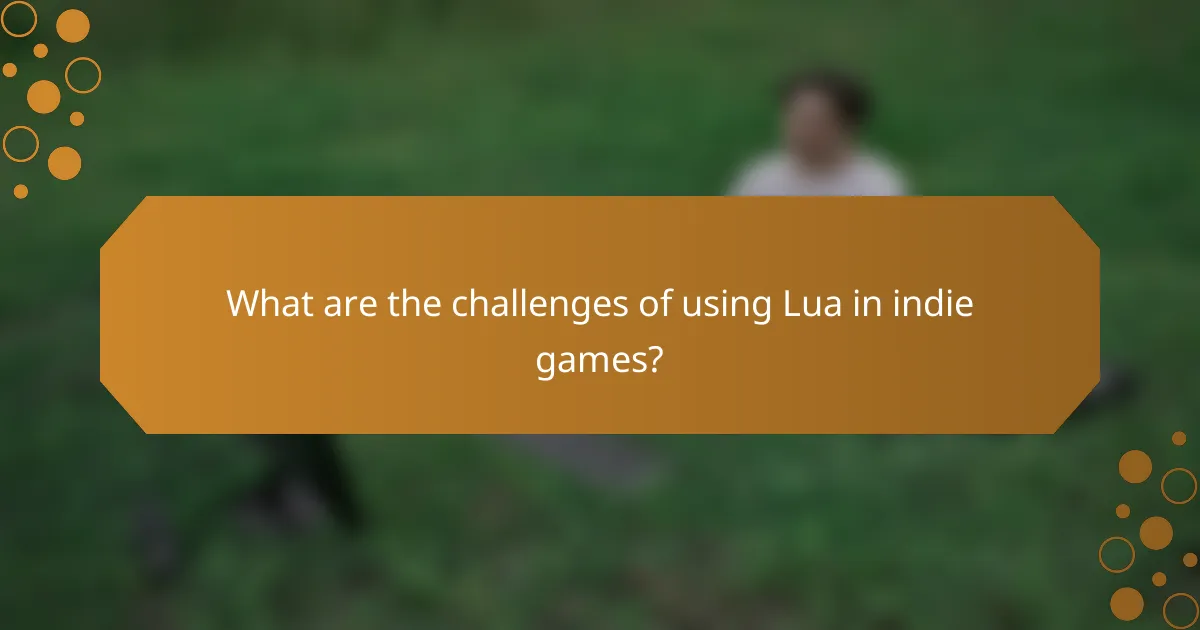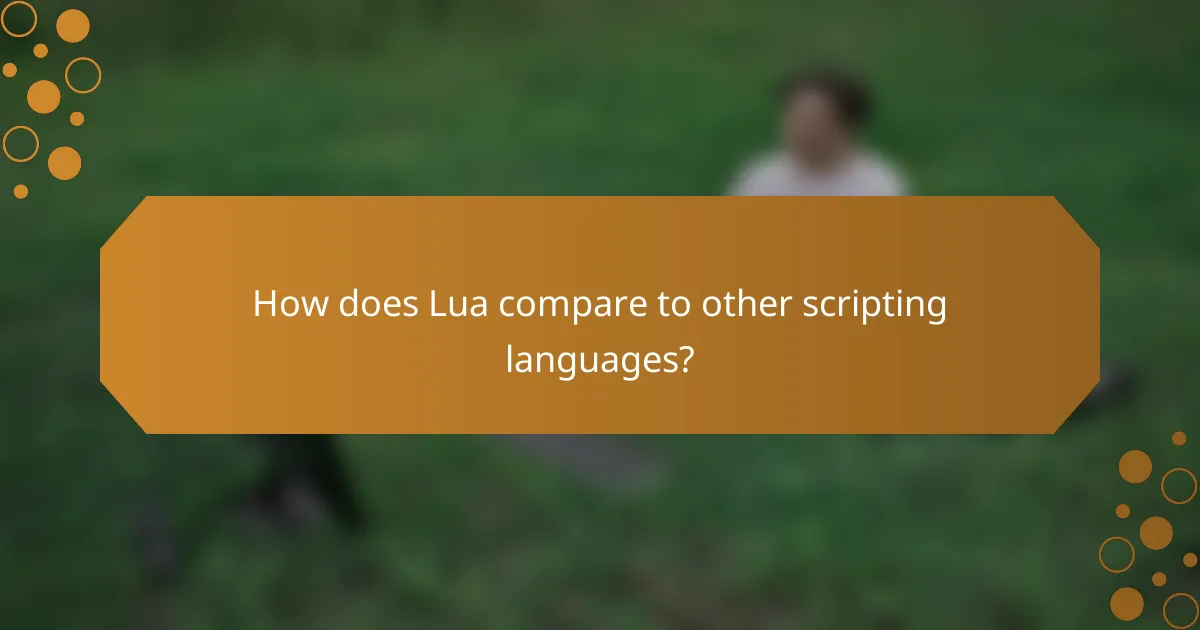Lua is a powerful scripting language that significantly enhances indie game development by providing a flexible and efficient environment for creating and modifying game mechanics. Its lightweight design and ease of integration make it particularly appealing for small teams, allowing them to focus on creativity while streamlining their workflow. With support from various game engines like Corona SDK, Defold, and Love2D, Lua offers indie developers the tools they need to bring their unique visions to life.

How can Lua enhance indie game development?
Lua enhances indie game development by providing a flexible and efficient scripting environment that allows developers to create and modify game mechanics quickly. Its lightweight nature and ease of integration make it an ideal choice for small teams looking to streamline their workflow and focus on creativity.
Lightweight scripting language
Lua is known for its minimal footprint, making it a lightweight scripting language that can run efficiently on various platforms. This is particularly beneficial for indie developers who often work with limited resources and need to optimize performance without sacrificing functionality.
Its simple syntax allows for easy learning and quick implementation, enabling developers to write scripts that control game behavior without becoming bogged down by complex code. This efficiency can significantly speed up the development process, allowing for more time spent on design and gameplay refinement.
Rapid prototyping capabilities
Lua’s design supports rapid prototyping, enabling developers to test ideas and mechanics quickly. By allowing for on-the-fly changes, developers can iterate on gameplay elements in real-time, which is crucial for refining user experience and gameplay balance.
Using Lua, indie developers can create prototypes in a matter of hours or days, rather than weeks, which is essential for validating concepts and gathering feedback early in the development cycle. This agility can lead to more innovative game designs and a better final product.
Integration with popular game engines
Lua integrates seamlessly with several popular game engines, such as Unity and Corona SDK, which are commonly used by indie developers. This compatibility allows teams to leverage Lua’s scripting capabilities while utilizing the robust features of these engines.
Moreover, many game engines provide built-in support for Lua, simplifying the setup process and reducing the learning curve. This means that indie developers can focus on creating engaging content rather than dealing with complex integration issues, ultimately leading to a smoother development experience.

What are the best game engines supporting Lua?
Several game engines support Lua for scripting, making it easier for indie developers to create games. Notable options include Corona SDK, Defold, and Love2D, each offering unique features and capabilities tailored for different types of projects.
Corona SDK
Corona SDK is a popular choice for mobile game development, providing a simple and intuitive interface for developers. It allows for rapid prototyping and deployment across multiple platforms, including iOS and Android.
One of the key advantages of Corona SDK is its extensive library of plugins and built-in features, which can significantly speed up development. However, developers should be aware that while the engine is free to use, there are fees associated with publishing apps on app stores.
Defold
Defold is a lightweight game engine that emphasizes performance and ease of use. It is particularly well-suited for 2D game development and supports both mobile and desktop platforms.
With a focus on collaboration, Defold offers a cloud-based service for version control and project management. Developers should consider that while it is free to use, the community support may not be as extensive as that of more established engines.
Love2D
Love2D is an open-source framework that allows developers to create 2D games using Lua. Its simplicity and flexibility make it a great option for beginners and experienced developers alike.
One of the standout features of Love2D is its strong community and wealth of resources, including tutorials and libraries. However, it requires more manual setup compared to other engines, which may pose a challenge for those looking for a more guided experience.

What are the key benefits of using Lua for scripting?
Lua offers several key benefits for scripting in indie game development, including its simplicity, speed, and strong community support. These advantages make it an ideal choice for developers looking to create engaging and efficient games.
Ease of learning for beginners
Lua is designed to be lightweight and easy to understand, making it accessible for beginners in game development. Its straightforward syntax allows new developers to quickly grasp programming concepts without being overwhelmed by complexity.
Many tutorials and resources are available online, enabling beginners to start scripting with Lua in a matter of hours. This rapid onboarding process can significantly reduce the learning curve compared to other programming languages.
High performance in game execution
Lua is known for its high performance, especially in game execution, where speed is crucial. Its just-in-time (JIT) compilation capabilities allow scripts to run efficiently, often achieving execution times in the low tens of milliseconds.
This performance is particularly beneficial in real-time applications, such as games, where lag can detract from the user experience. Developers can optimize their games by using Lua for tasks that require quick responses and low latency.
Strong community support
The Lua community is vibrant and active, providing a wealth of resources, libraries, and frameworks that can enhance game development. Developers can easily find help through forums, documentation, and community-driven projects.
Additionally, many game engines, such as Love2D and Corona SDK, integrate Lua, further expanding its usability. This strong support network ensures that developers can troubleshoot issues and share knowledge, fostering a collaborative environment for indie game creators.

What are the challenges of using Lua in indie games?
Using Lua in indie game development presents several challenges, including limited built-in libraries and debugging complexities. These issues can impact the efficiency and effectiveness of game scripting, requiring developers to adapt their approaches.
Limited built-in libraries
Lua has a smaller selection of built-in libraries compared to other programming languages, which can hinder functionality. Indie developers may find themselves needing to create custom solutions for common tasks, such as graphics rendering or sound management.
This limitation can lead to increased development time and complexity. To mitigate this, consider leveraging existing Lua frameworks or engines, like LÖVE or Corona SDK, which provide additional libraries and tools tailored for game development.
Debugging complexities
Debugging Lua scripts can be challenging due to the lack of advanced debugging tools compared to more established languages. Many developers rely on print statements or basic error messages, which can make identifying issues time-consuming.
To improve debugging efficiency, utilize Lua’s built-in debugging library, which allows for stack tracing and variable inspection. Additionally, integrating a more robust IDE that supports Lua can enhance the debugging process and streamline development.

How to get started with Lua for game scripting?
To begin using Lua for game scripting, familiarize yourself with its syntax and features, and set up a suitable development environment. Lua is lightweight and easy to integrate, making it a popular choice for indie game developers.
Setting up the development environment
Start by downloading the Lua interpreter from the official Lua website. You can also choose an Integrated Development Environment (IDE) like ZeroBrane Studio or Visual Studio Code with Lua extensions for a more streamlined coding experience.
Ensure you have the necessary libraries for game development, such as LÖVE or Corona SDK, which provide frameworks to build games using Lua. Follow the installation instructions specific to your chosen framework to set everything up properly.
Basic Lua syntax and concepts
Lua uses a simple syntax that is easy to learn. Key concepts include variables, control structures (like loops and conditionals), and functions. For instance, you can define a variable with local score = 0 and use if statements to control game logic.
Understanding tables is crucial, as they are the primary data structure in Lua, functioning as arrays and dictionaries. For example, you can create a table for player attributes like this: local player = {name = "Hero", health = 100}. This flexibility allows you to manage game data efficiently.

What resources are available for learning Lua?
Learning Lua can be facilitated through various resources, including online tutorials, courses, and books. These materials cater to different learning styles and levels, making it easier to grasp Lua’s scripting capabilities for indie game development.
Online tutorials and courses
Numerous online platforms offer tutorials and courses specifically for Lua programming. Websites like Codecademy, Udemy, and Coursera provide structured learning paths, often featuring video lectures, quizzes, and hands-on projects. These resources can range from beginner to advanced levels, allowing learners to progress at their own pace.
When selecting an online course, consider factors such as user reviews, course content, and the instructor’s expertise. Free resources are also available, such as the Lua official website, which includes documentation and community forums for additional support.
Books on Lua programming
Books can provide a comprehensive understanding of Lua, with many titles available for different skill levels. “Programming in Lua” by Roberto Ierusalimschy is a highly recommended resource that covers the language in depth and is suitable for both beginners and experienced programmers.
Additionally, consider books that focus on game development with Lua, such as “Lua Game Development in 24 Hours.” These titles often include practical examples and projects that can help reinforce learning. When choosing a book, check for the latest editions to ensure you are getting the most up-to-date information and practices.

How does Lua compare to other scripting languages?
Lua is lightweight and designed for embedded use, making it particularly suitable for game development compared to other scripting languages. Its simplicity and efficiency allow for fast execution and easy integration with C/C++ engines, which is crucial for performance-sensitive applications like games.
Lua vs Python for game development
Lua and Python serve different purposes in game development. Lua is often preferred for its speed and smaller footprint, which is essential for real-time applications. Python, while more versatile and user-friendly, can be slower and more resource-intensive, making it less ideal for performance-critical game components.
For instance, Lua is commonly used in engines like Love2D and Corona, where rapid execution is necessary. Python, on the other hand, is frequently utilized for scripting and automation tasks in game development, such as level design or asset management, due to its extensive libraries and ease of use.
Lua vs JavaScript in game engines
Lua and JavaScript both play significant roles in game engines, but they cater to different needs. Lua is often embedded within game engines for scripting game logic, while JavaScript is more commonly associated with web-based games and browser environments. Lua’s lightweight nature allows for seamless integration with C/C++ code, which is a common requirement in many game engines.
In terms of performance, Lua typically outperforms JavaScript in scenarios requiring low latency and high efficiency. However, JavaScript benefits from a vast ecosystem and is ideal for developing cross-platform games that run in browsers, making it a strong choice for web-based projects.



